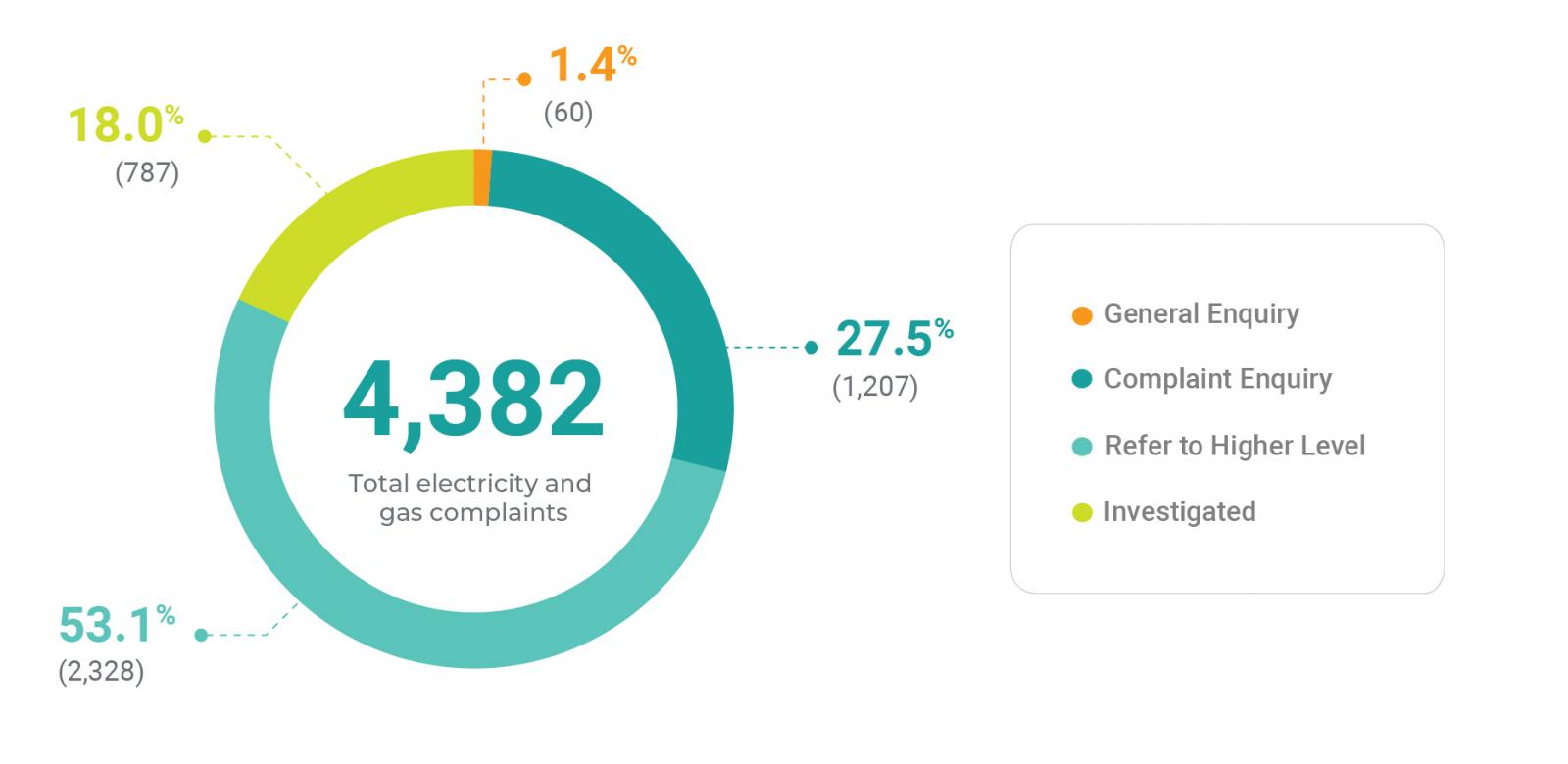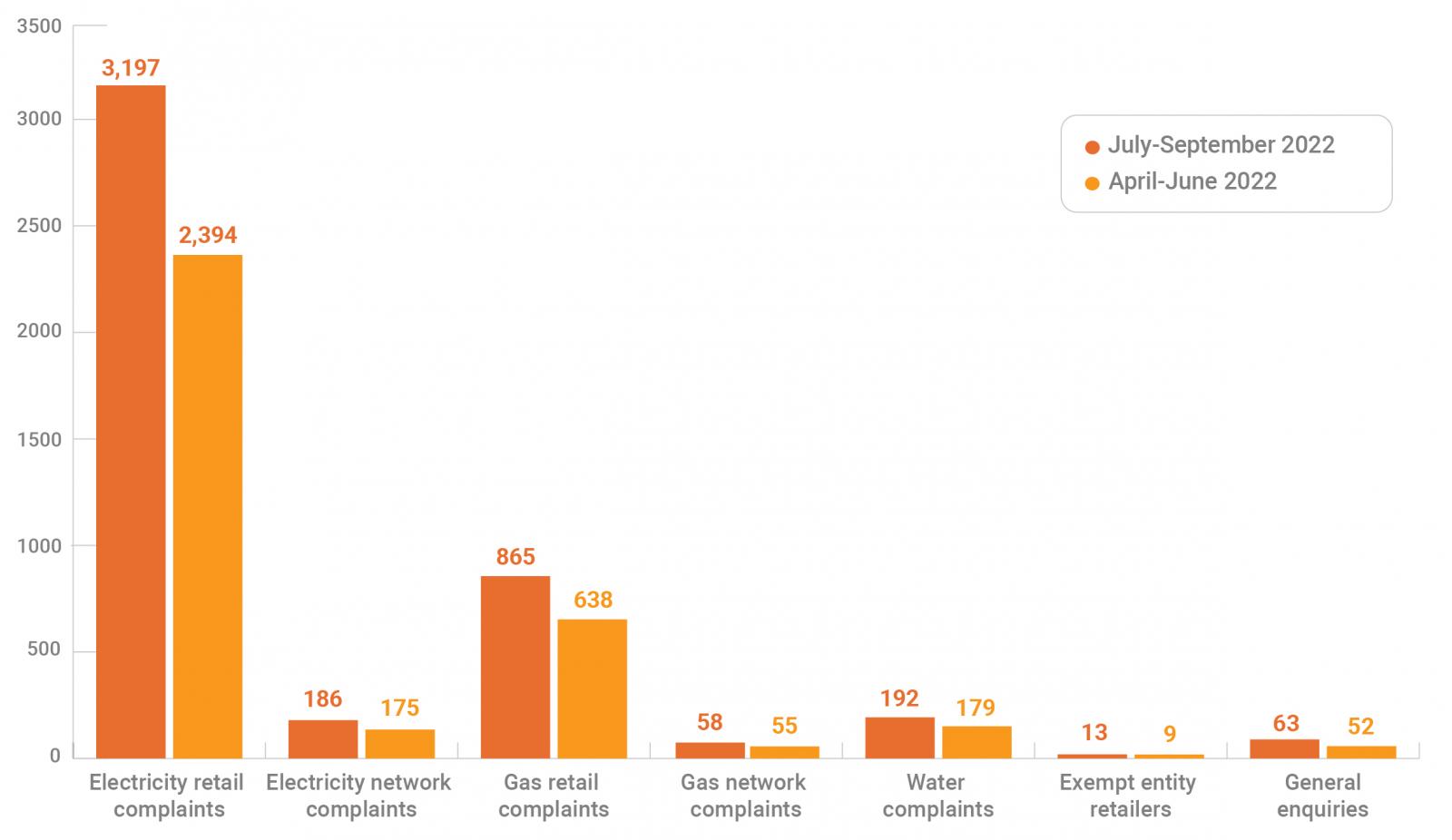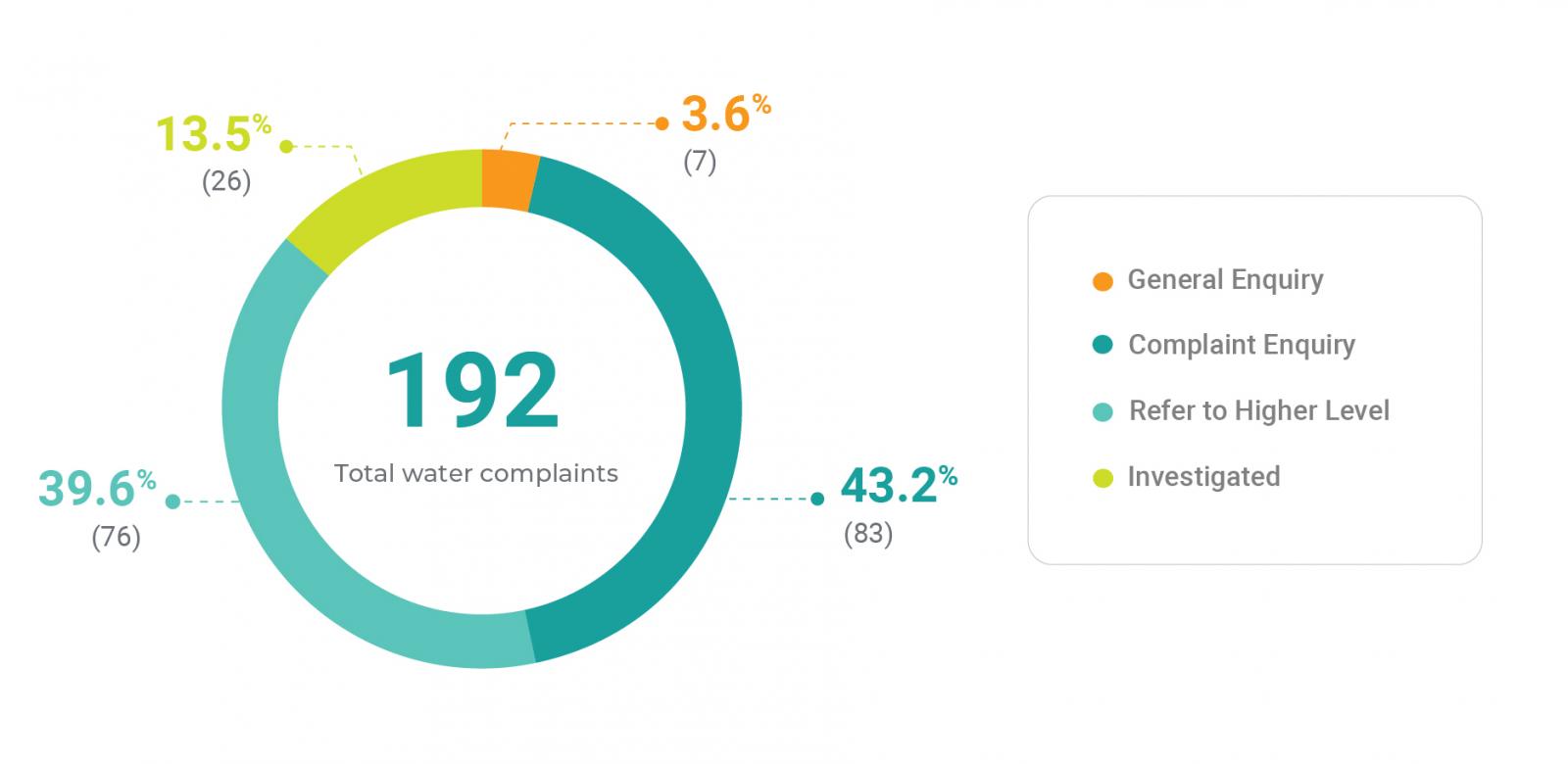
Table 4 – Energy complaint breakdown July to September 2022
|
Complaint type
|
Number of complaints
|
% total energy complaints
|
|
General enquiry
|
60
|
1.4%
|
|
Complaint enquiry
|
1,207
|
27.5%
|
|
Refer to higher level
|
2,328
|
53.1%
|
|
Investigated
|
787
|
18%
|
|
Total
|
4,382
|
100%
|
Energy complaints – impacts following incarceration
People entering the prison system, or undergoing periods of incarceration, face significant obstacles when trying to resolve problems with their energy accounts. The difficulties caused by incarceration also impact on the prisoner's household, placing additional financial stress on the family. Energy account problems also often continue after the period of incarceration ends through debt collection and credit default listings for unpaid accounts.
EWON generally does not receive complaints directly from NSW prisoners. However, we do receive some complaints from energy customers who have been incarcerated and their families and advocates. The complaint issues we have seen include:
- the billing of electricity accounts during the period of incarceration
- an advocate’s access to information about a prisoner’s energy account
- payment difficulties experienced by household members due to a customer being incarcerated
- opening and closing of accounts during periods of incarceration
- debt collection and credit default listings that relate to a period of incarceration.
 Case Study: Customer pursued for accumulated debt while he was in prison
Case Study: Customer pursued for accumulated debt while he was in prison
A debt collection agency contacted a customer about an unpaid energy account and provided him with a bill in his name covering a four-year period. He disputed the bill with the collection agency because he had never lived at that supply address. The debt collection agency asked the customer to provide proof of where he was living for the time covered by the energy bill. The customer contacted EWON for assistance and explained that he had been incarcerated for two of the four years that the energy bill covered. The customer had not contacted the energy retailer directly to discuss the bill.
EWON explained the obligations energy retailers have when opening energy accounts for customers, including the requirement to obtain explicit informed consent for market contracts. EWON referred the customer to the energy retailer directly to request records confirming he opened the account and was liable for the unpaid bill. We also advised him that he could return to us if he was unhappy with the outcome.

Case Study: Household struggles to manage electricity account
A customer’s household member contacted EWON to complain that the electricity to her home had been disconnected for over a week for non-payment of outstanding bills. She advised EWON that she was experiencing financial difficulties and was struggling to pay the bills. The electricity account was in the name of her partner who had been incarcerated and could not help paying the account. She had tried to open an account in her own name, but the request had been declined because she had a poor credit history.
EWON advised the customer that the current retailer for the property (the Financially Responsible Market Participant or ‘FRMP’) must make a standing offer for her to open an electricity account. EWON checked the national metering database and confirmed that the retailer that held her partner’s account was the FRMP and was required to make her a standing offer. EWON referred the customer to the retailer to open an account and get the electricity reconnected. We also advised her to return to us if her request to open an account and be reconnected was refused by the retailer.

Case Study: Former prisoner default listed for old debt
A customer was incarcerated for three months and was unable to close the electricity account for his home address. His landlord cancelled the customer’s lease the same month that he was incarcerated which meant he no longer resided at the property. Three months later the energy retailer issued an electricity bill of $279 covering the three months he was incarcerated. Three years later, he discovered that the energy retailer had placed a credit default listing on his credit file for an amount of $747, covering a further six months after the original bill had been issued. The customer complained to the retailer that the credit listing related to the period he had been incarcerated and had been unable to close the account. The customer emailed the energy retailer asking for a review of the credit default listing. The customer contacted EWON a month later after he had received no response from the retailer.
We referred the matter to the retailer for resolution at a higher level, which the customer accepted knowing he could return to us if he was unhappy with the outcome.
Two day switching
In our January to March 2022 edition of EWON Insights we reported that customers can now switch retailers in as little as two business days due to changes to rules and procedures to bring switching timeframes in line with advances in the energy market. The changes came into effect on 1 October 2021, and they enable, but do not guarantee, switching within two business days for all customers by:
- removing the option for retailers to choose the next scheduled meter read as the transfer date in most circumstances
- expanding the timeframe to use a past actual meter read for manually read meters from 10 to 65 business days (the limit for remotely read meters remains 10 business days)
- making it easier for retailers to arrange a transfer while still within the 10-business day cooling off period
- making it easier to arrange a transfer reversal when a customer exercises their cooling off rights
- allowing estimated meter reads to be used for transfers for manually read meters
- limiting the opportunity for a current retailer to object to a pending transfer.
While retailers and market participants are expected to develop rigorous business-to-business practices over time to address any problems that arise from the changes, there are some unintended issues and consequences arising since the changes came into effect.
The following case studies illustrate some of the ongoing issues. For instance, two-day switching does not apply to gas transfers, however the rules do not preclude it as gas transfers are possible on estimated meter readings or special meter reads. EWON received multiple complaints from customers who were notified of a gas price increase from their current retailer which prompted them to try and switch to a new retailer with lower prices. However, they ended up waiting until the next scheduled read date for the transfer, resulting in a period of time of being billed higher rates.

Case Study: Gas transfer delay causes financial disadvantage
A customer received a notice from his retailer advising him of a significant price increase to his gas rates. He contacted his preferred retailer in May 2022 to establish a gas account as soon as possible. The preferred retailer advised him that it could arrange for a special meter reading to occur, which would mean that his account would transfer before the next scheduled meter reading. He agreed to this, along with the associated fee for the special meter reading. He was advised that the meter reading would occur within 10 days, however nobody attended to read the meter. The customer contacted the retailer on several occasions, however was unable to resolve the issue and was continuously advised it would take a few more days.
EWON contacted the retailer to obtain more information and it arranged for the meter to be read, with the account transferring in August 2022. The retailer offered a credit of $770 for the financial impact of the delay in transfer. The customer was satisfied with this outcome and confirmed he would contact the retailer to arrange for a refund.

Case Study: Transfer timing causes stress
After receiving a notification from his retailer that his rates would increase in five business days, a customer switched to a new retailer on 31 May 2022 with rates locked in for 12 months. The new rates were lower than his current retailer’s rates would be once the increase kicked in, but were higher than his existing rates with the current retailer.
He received an electricity bill from the new retailer for the period 3 March 2022 to 3 June 2022 for $30. He disputed the start date of the account as it was billed at a higher rate than the previous retailer and had a lower solar rebate, causing him financial disadvantage. He was also concerned that the locked in rates on his contract would end three months earlier than he had agreed to, which may further impact him in the future if energy prices continue to increase. He contacted the new retailer and asked for his electricity contract to commence from 3 June 2022, however this was declined. The retailer advised him that the meter had been read on 3 June 2022 and he considered this to be unreasonable.
EWON contacted the retailer to obtain more information and it advised that it would apply a credit to the account of $127 for the difference in the solar rebate and waive the electricity charges of $30. The retailer also adjusted the start date of the account to 3 June 2022, with the 12-month contract to expire on 3 June 2023. The customer was satisfied with the outcome of his complaint.

Case Study: Customer billed by previous retailer and new retailer
A customer established an electricity account with his new retailer in August 2022. However, his first bill from the new retailer was unexpectedly high for the period 1 June 2022 to 26 August 2022. He had already been billed by his previous retailer for usage up to 20 August 2022 and he had paid the bill. The transfer date was different to the start date of his contract with the new retailer.
He contacted his new retailer to dispute the backdated transfer and request they change the transfer date so that he did not pay for his energy twice. The new retailer advised the customer to contact his previous retailer fora refund. He advised that his previous retailer had gone into administration and it would be difficult to get a refund. The new retailer referred him to the administrators of the previous retailer, however he considered this to be unreasonable as the backdated transfer was due to the actions of the new retailer, not the previous retailer.
We referred the matter to the new retailer for resolution at a higher level, which the customer accepted knowing he could return to us if he was unhappy with the outcome.
Flood response
Throughout 2021 and 2022, NSW endured unprecedented rainfall which resulted in extreme flooding. Many customers were displaced from their homes, electricity was disconnected for safety reasons, and communities experienced long periods without power and accommodation.
On 11 March 2022, the Australian Energy Regulator (AER) wrote to authorised energy retailers operating in NSW and Queensland urging them to provide additional assistance to customers affected by floods. It encouraged actions such as:
- not disconnecting any residential or small business consumers who may be in financial stress (including those in embedded networks) due to the flooding without their agreement
- deferring referrals of residential and small business consumers to debt collection agencies for recovery actions or credit default listing
- waiving disconnection, reconnection and/or contract break fees for small businesses that have ceased operation, along with daily supply charges to retailers, during any period of disconnection.
At the AER’s request, EWON monitored and reported any cases with potential compliance issues to the AER for a period of six weeks, however we are still receiving complaints from flood affected customers. The following cases highlight the ongoing issues faced by customers over six months after the flooding, and the benefits of having additional assistance in place for customers faced with extreme weather events.

Case Study: Customer billed for period without electricity
A customer had no electricity supply at her property between 28 February 2022 and 19 May 2022. The property was affected by a major flood which destroyed the electricity meter and made the property unlivable. In March 2022, she received an amended bill for the period 21 December 2021 to 25 March 2022 for $460 and in May 2022 she received a bill for the period 24 March 2021 to 25 March 2022 for $1,960.
She advised that her electricity account had previously been in credit by over $2,000, and she made ongoing fortnightly payments of $75. She contacted the retailer to dispute the bills in June 2022, advising that there had been no supply at the property since 28 February 2022. She requested that the retailer disconnect the supply again as the property was still uninhabitable due to flood damage. The retailer arranged for the supply to be disconnected however advised her that the bills were correct and payable.
After the supply was disconnected, she received a final estimated bill for the period 26 March 2022 to 8 June 2022 for $298. This was followed by an amended final bill for $398. The customer also received an overdue notice advising her of credit collection activity. She was confused by the amended bills that she had received and considered that she should not be charged when there was no supply at the property.
EWON contacted the retailer and it advised the disputed bills had been reversed and reissued for a lesser amount, resulting in a credit of $440 which was refunded to the customer. The retailer offered to waive charges at the property from 28 February 2022 to 8 June 2022 and part of the billing for the period 21 December 2021 to 25 March 2022, resulting in an additional credit of $230 being refunded. The customer was satisfied with the resolution.

Case Study: Customer confused by multiple amended bills
A customer’s property had been affected by floods on 28 February 2022 and there was no electricity supply at the property. She received an estimated bill for the period 3 December 2021 to 2 March 2022 for $749 and an estimated bill for the period 3 March 2021 to 31 May 2022 for $881. She then received an amended electricity bill for the period 3 December 2021 to 28 February 2022 for $666.
She had contacted the retailer to dispute the bills and it advised her that the billing was correct and payable. She then started to receive credit collection calls for the overdue amount. She was concerned about having to contact the retailer on multiple occasions to explain the situation repeatedly and revisit ongoing trauma.
EWON contacted the retailer and it advised that the initial bills had been cancelled and the account closed as of 28 February 2022, which had resulted in a final bill for $660 being issued. To assist in the resolution of the complaint, the retailer offered to waive the balance of the account. The customer was satisfied with the outcome.

Case Study: Customer with no meters received disconnection warnings
A customer was significantly impacted by floods in NSW in February 2022, and as a result the power at the property was disconnected. She received a notice from her energy retailer advising she would receive an estimated electricity bill. She received the estimated electricity bill for the period 23 February 2022 to 26 May 2022 for $580. She had contacted her retailer to advise that there had been no power at the property since the flooding, that she was currently living in a tent in her back garden while the property was rebuilt and that there was still no power at the property as the meters had been removed.
The customer then received collections activity from the retailer on four occasions and each time contacted it to advise it of the circumstances. Even though she repeatedly contacted the retailer, she kept receiving collections activity including a disconnection warning. The retailer kept advising that the bill was payable and offered a payment arrangement.
The customer contacted EWON in July 2022 for assistance and the matter was referred to the retailer at a higher level. She was contacted by the retailer as part of the referral process, and it advised her that she would stop receiving contact and that she could contact them to arrange a new electricity account when the new meters are installed. This was confirmed in writing on 29 July 2022.
The customer returned to EWON on 22 August 2022 as she received another disconnection warning. EWON contacted the retailer to obtain more information and it advised that it had backdated the closure of the customer’s electricity account to 22 February 2022 and the bills issued to the customer since that date had been reversed. This resulted in the customer’s account being in credit by $67. It also advised that it had received estimated data from the distributor as the customer’s electrician had not returned the removed meters to the distributor, so they had remained on the system. As it had received estimated data, they had automatically sent notices to the property but addressed to ‘Dear Occupier.’
The customer was advised that if the electrician were to send the meters back to the distributor or complete a Notice of Service Work the system could be updated to show that the meters had been removed. This would prevent further estimated data and notices being sent to the property.

Case Study: Retailer inflexible about payment arrangement
A customer was significantly impacted by flooding on 28 February 2022, which resulted in no power at the property until 11 May 2022, when a new meter was installed. He advised that new wiring and significant repairs were made to the property as a result of the damage from the flooding.
He received an estimated bill based on usage from the previous year and a notice from the retailer that his bill smoothing repayments needed to be increased. He contacted the retailer to dispute the estimates and advised that there was no usage at the property, however it told him the billing system automatically calculated the payments and did not offer any further options to adjust the billing or ongoing payment.
After the new meter was installed on 11 May 2022, he received a bill for the period 20 March 2022 to 24 June 2022 for $808. The customer advised there were only two power points used at the property for most of the billing period as other appliances had not yet been installed. He contacted the retailer to raise his concerns, however had not been able to resolve the issue with them directly. He was concerned as he was making ongoing payments of $150 per fortnight towards his account. He considered that his account should be in credit and that his ongoing payments should not need to be increased.
During the EWON investigation, the retailer advised that it would waive the disputed bill for the period 20 March 2022 to 24 June 2022 for $808, as it was mainly based on estimated consumption while the premises did not have electricity supply. As the customer had already paid the bill due to the ongoing payment of $150, this would put the account in credit by $1,000. It also advised that the ongoing payment of $150 would not be increased. The customer was satisfied with the outcome of the complaint.






 Case Study: Customer pursued for accumulated debt while he was in prison
Case Study: Customer pursued for accumulated debt while he was in prison
